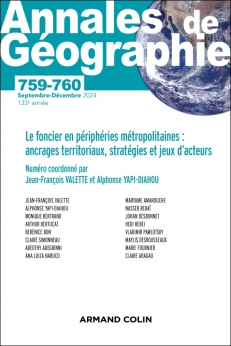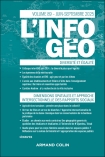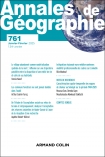
ANNALES DE GÉOGRAPHIE N°759-760 (5-6/2024)
Pour acheter ce numéro, contactez-nous
Recevez les numéros de l'année en cours et accédez à l'intégralité des articles en ligne.
La réversibilité est un terme de plus en plus mobilisé par la profession immobilière dans un contexte de sobriété foncière pour réhabiliter des bâtiments et les destiner à des usages renouvelés. En la transposant au foncier, elle s’avère être un levier intéressant pour articuler les univers urbains et ruraux autour de cette ressource qu’ils partagent en périphérie des villes et sur laquelle s’exercent des concurrences fortes. L’article montre l’intérêt de mobiliser cette notion pour le foncier ; il propose pour cela de la discuter et de la nourrir dans une dimension à la fois épistémologique et opérationnelle. La démarche repose sur un décloisonnement des catégories, rural et urbain, et des concepts souvent très situés, au Nord (consommation et cohérence foncières, porosité du droit par exemple) ou au Sud (informalité, faisceau de droits entre autres). Cette posture, celle d’une géographie traversière reposant sur une méthode compréhensive, permet de croiser les dimensions politique, juridique, technique et économique d’une réversibilité au service d’un progrès social et environnemental. L’article souhaite in fine contribuer au débat qui porte sur les concurrences foncières dans les périphéries métropolitaines en relevant des formes de transactions entre villes et campagnes, sans en occulter la part conflictuelle, dans la manière de gouverner la terre et d’en faire un usage évolutif, réversible.
Reversibility is a term increasingly used by the real estate profession in a context of land sobriety to rehabilitate buildings and put them to new uses. By transposing the notion to land, it proves to be an interesting lever for linking urban and rural worlds around this resource that they share on the outskirts of cities, and over which there is strong competition. This article demonstrates the value of mobilizing this concept for land management, and proposes to discuss and nurture it in both epistemological and operational terms. The approach is based on a decompartmentalization of categories, rural and urban, and of concepts that are often highly situated, in the North (land consumption and coherence, law’s porosity) or in the South (informality, bundling of rights, among others). This posture, that of a traversing geography based on a comprehensive method, makes it possible to cross the political, legal, technical and economic dimensions of reversibility in the service of transition or social and environmental progress. Ultimately, the article aims to contribute to the debate on land competition in the metropolitan periphery by highlighting the forms of transactions between town and country, without obscuring the conflictual aspect, in the way land is governed and used in an evolving, reversible way.

